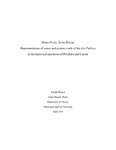Homo Ferus, Terra Divisa: Representations of Space and Custom North of the Res Publica in the Historical Narratives of Polybius and Caesar (thesis)

View/
Author
Morgan, Joseph Railton
Subject
Washington and Lee University -- Honors in Classics
Civilization, Celtic -- Historiography
Celts
Gauls
Historiae (Polybius)
De bello Gallico (Caesar, Julius)
Personal narratives
Rome (Empire)
Metadata
Show full item recordDescription
Thesis; [FULL-TEXT RESTRICTED TO WASHINGTON AND LEE UNIVERSITY LOGIN] Joseph Railton Morgan is a member of the Class of 2014 of Washington and Lee University. Writers of diverse backgrounds within the classical tradition, whether composing histories of the Roman Republic or treatises on geography, all had something to say about the Celts, and in particular the Gauls, a group of Celtic tribes that Rome dealt with frequently in the Republican period. Certain core elements in the representation of these peoples are traceable in authors as divergent in background, style, and agenda as Polybius of Megalopolis and Gaius Julius Caesar. A comparison of Polybius' Historiae and Caesar's Commentarii de Bello Gallico yields insights into the types of historical patterns and cultural observations which ancient writers relied upon to explain the connections between events in their narratives and in doing so engaged with the historiographical tradition. This comparison also highlights the way in which these two representations differed. Before exploring the works of Polybius and Caesar, however, a brief summary of Romano-Gallic relations from the fourth through the first centuries BCE is required in order to provide the historical context of these narratives. [From Introduction] Joseph Morgan